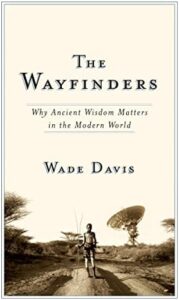 The Wayfinders: Why Ancient Wisdom Matters in the Modern World
The Wayfinders: Why Ancient Wisdom Matters in the Modern World
Book Author – Wade Davis
Book Publication Date – October 13, 2009
Book Publisher – House of Anansi Press
Print Length – 280 pages
Book Description
Cultural diversity and social cohesion elementally shape the moral and ethical foundations of peacebuilding in the 21st century. This Peaceful Readers Book Club selection seeks to deepen one’s appreciation for cultures and traditions that differ from one’s own with a focus on peace, tolerance, and gratitude. Readers will explore the kaleidoscopic marvel of cultural expressions and human genius that spans across the globe. This book posits that every culture is a unique answer to a fundamental question: What does it mean to be human and alive?
“Anthropologist and National Geographic Explorer-in-Residence Wade Davis leads us on a thrilling journey to celebrate the wisdom of the world’s indigenous cultures. In Polynesia we set sail with navigators whose ancestors settled the Pacific ten centuries before recorded history’s Common Era. In the Amazon we meet the descendants of a true Lost Civilization, the people of the Anaconda. In the Andes we discover that the Earth really is alive, while in the far reaches of Australia we experience Dreamtime, the all-embracing philosophy of the first humans to walk out of Africa. We then travel to Nepal, where we encounter a wisdom hero, who emerges from forty-five years of meditation retreat and solitude. And finally we settle in Borneo, where the last rainforest nomads struggle to survive.
Understanding the lessons of this journey will be our mission for the next century. For at risk is the human legacy — a vast archive of knowledge and expertise, a catalogue of the imagination. Rediscovering a new appreciation for the diversity of the human spirit, as expressed by culture, is among the central challenges of our time.”
Book reviews available, including from Orion Magazine and goodreads.
Reflection Questions
- In this book, Davis exalts the wisdom of ancient lifeways. What aspects of our modern-day culture do you think should also be celebrated? What assets can you identify in your community that you think would benefit others by being shared?
- Dr. Davis contends that languages operate as expansive repertoires of human understanding. Do you have any experience with speaking or being exposed to another language? In what ways has it affected your life?
- What do you see as potential barriers to cultural diversity in your community? In what ways could you or members of your community transcend these cultural barriers? Consider the influence of language, ethnicity, race, nationality, socioeconomic status, religious beliefs, sexual orientation, or other group identity markers.
- What role does humility play in the process of learning from cultures different than one’s own?
- The book highlights how “the potency of a belief, the manner in which conviction plays out in the day-to-day lives of a people, determines the ecological footprint of a culture, the impact that any society has on its environment” (pp. 122-123). How would you describe your culture(s)’s relationship to the environment? Do any of the lessons in this book particularly resonate as teachings for you?
- How can the peacebuilding movement help address Western culture’s issues and dilemmas? What lessons do you think could be learned from other cultures in dealing with violence and aggression in our communities?
Learning Resources
- The Wayfinders Information Sheet
- The Anthropology for Kids project including books, workshops, and conversations for youth
- Video – “Chimamanda Ngozi Adichie: The danger of a single story” at TEDxTalks (19:16)
- Video – “Wade Davis: Light at the Edge of the World” at Bioneers (22:49)
- Video – “Activist Anthropology | Wade Davis (Talk + Q&A) at Long Now Foundation (54:07)
- Video – “Wade Davis: The worldwide web of belief and ritual” at TEDxTalks (19:12)
- Dr. Wade Davis’ Personal Website
Action Recommendations
- While The Wayfinders explores cultural diversity across the globe, the lessons Davis discusses offer distinct applications for local communities. These three key strategies can help encourage an intercultural lens of diversity, equity, and inclusion across a wide range of domains in your life:
- Reflect on your own culture’s strengths and opportunities for growth. In doing so, think about your culture’s lessons, stories, art, music, folktales, cuisine, health practices, or any other mode of cultural production. Offer to share your culture with others and respectfully invite others to share their culture with you.
- Consider how issues of conflict, aggression, or violence might be affected by cultural forces and values. Similarly, consider how expanding or shifting one’s cultural perspective might help promote reconciliation, mediation, or peacebuilding.
- Seek opportunities and resources for cultural interaction and exchange. Although international and intercultural experiences can be applied across a wide variety of one’s community or recreational activities, also consider volunteering for cultural organizations or refugee support services.
Do Something Right Away to Increase Peace
Subscribe to our YouTube channel
Give a gift of money to support Peace Through Action’s mission delivery activities
Choose opportunities to take part in our #PeaceBeginsWithWe campaign
